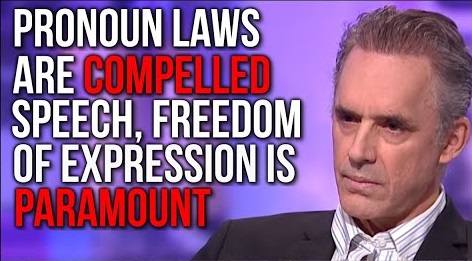Following up on Brendan O’Neill’s report from last week, Andrew Doyle explains why it’s essential for sensible people to resist compelled speech, which these mandatory pronoun declarations clearly are:
This is how it begins. “Why not add your pronouns to your email signature?” “Why not announce your pronouns at the beginning of meetings?” “Why not encourage your staff members to ask for pronouns in day-to-day conversation?” After all, it’s just about being compassionate and creating a more “inclusive” work environment. Only a bigot would object to that …
It’s this kind of skewed reasoning that has led to the firing of Fran Itkoff, a 90-year-old volunteer for the National Multiple Sclerosis Society in the USA, who simply expressed confusion when faced with a request that she add pronouns to her emails. “I had seen it on a couple of letters that had come in after the person’s name”, Itkoff said in an interview, “but I didn’t know what it meant”.
[…]
Like the vast majority of the population, I use pronouns to denote the biological sex of the person to whom I’m referring. And I certainly would not comply if commanded to declare my own due to my innate aversion to any form of compelled speech. The lessons of history are clear: when those in authority begin to demand the use of certain phrases, they have taken the first step on the pathway to tyranny. I do not wish to see a future in which we are forced to stand in lockstep and chant the approved slogans of the ruling class.
Of course, the declaration of pronouns is far removed from any such scenario, but the principle to me is sacrosanct. I will not be told what to say by anyone, least of all those who claim to know what is best for the good of society. Authoritarians have always couched their demands in faux-benevolence, and we have seen how gender ideologues have a particular tendency to viciousness and bullying. “Be kind … or else” is not a maxim to which I am willing to capitulate.
To ask for pronouns in the workplace is the equivalent of suggesting that employees pledge fealty to a deity they do not worship. It is a kind of test, a way to ensure that the tenets of Critical Social Justice – otherwise known as “wokeness” – are being observed. Spinoza argued that for any man to “be compelled to speak only according to the dictates of the supreme power” is a violation of his “indefeasible natural right” to be “the master of his own thoughts”. Once you agree to make statements in favour of a belief-system you do not hold, you are surrendering your agency to those who will exploit it.
While the declaration of pronouns remains a purely voluntary matter, it is fair to say that no-one’s free speech is being violated. But the consequences for non-compliance in the workplace are becoming increasingly severe. Members of staff are passed over for promotion, they are smeared as unreconstructed bigots and “transphobes”, and eventually shunned and isolated. I have written before about friends of mine in the acting profession who feel uncomfortable in stating pronouns at the beginning of rehearsals, but know that they are unlikely to be recast if they refuse. This may not be compulsion, but it is coercion.




